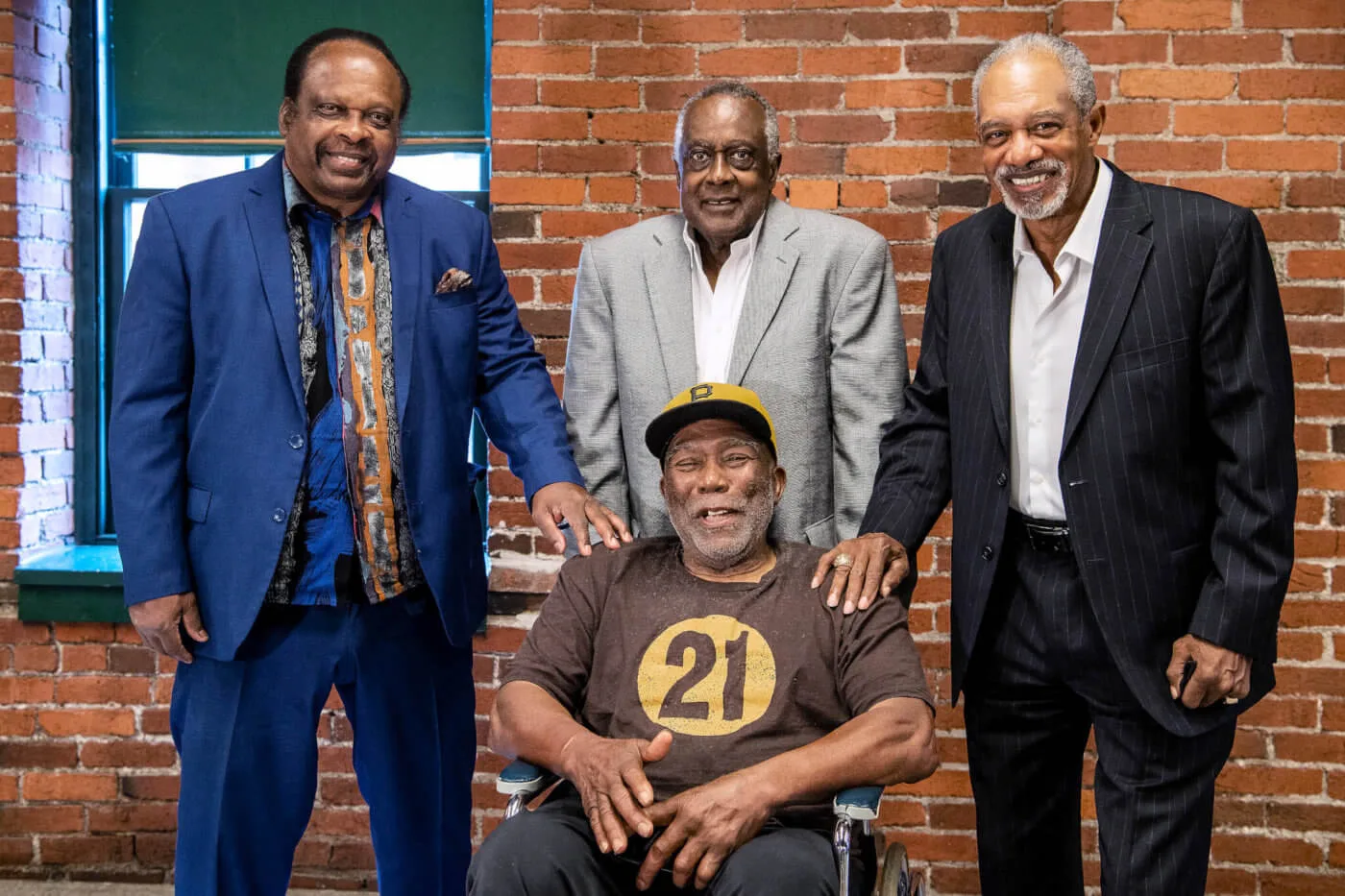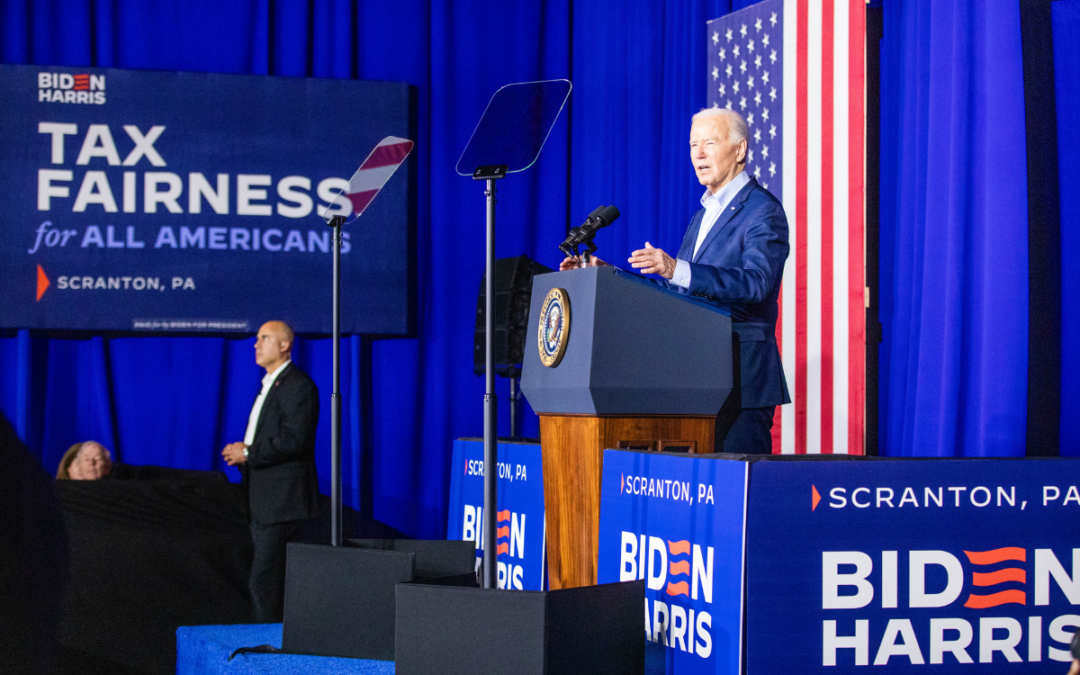
Al Oliver, Gene Clines, Manny Sanguillen, seated, and Dave Cash pose for a portrait during an event hosted by the Pittsburgh Pirates to celebrate the 50th anniversary of the first all-minority lineup to take the field in Major League Baseball history, at the Heinz History Center, Wednesday, Sept. 1, 2021, in Pittsburgh. (Alexandra Wimley/Pittsburgh Post-Gazette via AP)
50 years after they were part of the first all-minority lineup fielded by a Major League Baseball team, former Pittsburgh Pirates commemorate a feat no one really noticed in the moment.
PITTSBURGH — In the moment, it wasn’t a big deal. Just another game in the middle of the week in the middle of a pennant race.
The best nine players available ran onto the field at Three Rivers Stadium for the Pittsburgh Pirates on Sept. 1, 1971.
The fact all nine — Rennie Stennett, Gene Clines, Roberto Clemente, Willie Stargell, Manny Sanguillen, Dave Cash, Al Oliver, Jackie Hernandez, and Dock Ellis — were Black or of Latin descent didn’t even really occur to them until afterward.
Oliver has always found it curious as to why it hasn’t been celebrated the way Jackie Robinson breaking the color barrier in 1947 is. Yet in recent years, he’s come to take it as a compliment of sorts, a nod to the color-blind approach Pirates manager Danny Murtaugh took to his job.
“We didn’t take the field, you know, to make history,” Oliver said Wednesday night while honoring the 50th anniversary of a 10-7 win over Philadelphia. “But as it turned out, it was history. And the thing that I feel great about it was that it proved the unity that we had on our team and proved that we had a manager that really (wasn’t) concerned about race.”
Oliver, a seven-time All-Star during his 18-year career, figures the sea of black and brown faces with the gold ‘P’ on their caps was simply the byproduct of the way general manager Joe Brown went about constructing a team.
“(He said) ‘What we did, we signed players because they can play, not the church they went to,'” said Oliver, who played first that night. “And every time I hear that quote, I’ve got to laugh because it’s true. It doesn’t matter what church you go to as long as you can play some ball.”
Something that was never an issue for the “Lumber Company” era in Pittsburgh. The victory over Philadelphia that night came during a torrid 18-5 stretch that allowed the Pirates to win the NL East. Pittsburgh went on to beat San Francisco in four games in the NL Championship Series before rallying from a two-game deficit to edge heavily favored Baltimore in the World Series.
“You could never underestimate what we thought we could do as a team, because we could beat anybody,” Cash said. “Baltimore had beat everybody else, but they hadn’t beat us.”
Not with Hall of Famers like Clemente in right field and Stargell in left and Oliver usually in between. It’s telling that the only thing Oliver noticed about the lineup wasn’t its racial makeup but his spot in it: seventh.
“I thought I was a pretty good hitter,” Oliver, a .303 lifetime hitter, said with a laugh. “But when I looked at the card, I’m hitting seventh, and I said, ‘Hey, this has to be a great team.'”
It was. While Oliver remembers the day being met with a shrug of sorts, over five decades it has taken on new meaning for the grandfather of four.
“It is important to (my children and grandchildren) to know that their people were part of baseball history,” he said. “I think that’s the key. You know, that’s something that can be passed down, something that cannot be taken away. And I just feel good that they are aware of that fact.”
Even if it’s a moment that may be difficult to replicate. The surviving members of the 1971 team believe it’s more likely that a team fields an entirely all-Latin lineup before one featuring all Black and Latin players. Participation in baseball among Blacks has dropped across the board, and Black players currently make up less than 10% of Major League rosters.
“Afro-American kids have gravitated to basketball, they have gravitated to football,” Oliver said. “And the reason why they’ve done that is that’s all they really see on TV, on commercials, all the football players and the basketball players. But you really don’t see a lot of baseball players doing commercials. And, you know, as an Afro-American individual, you have a tendency to do things that look like you.”
It plays in stark contrast to how Oliver grew up in Ohio in the 1950s and 60s, when he idolized Jackie Robinson and Frank Robinson.
“I knew Clemente was playing, and (Willie) Mays and (Hank) Aaron,” Oliver said. “We used to get their bubblegum cards all the time. So we had something to look at that looked like us. And until we get back to that, we may not see another mixture of those type of players together.”
For one night, anyway, Oliver and his teammates played a part in something that’s grown far larger than themselves. For 2 hours and 44 minutes in front of 11,278 fans, the Pirates became the ideal of what civil rights activist Dr. Martin Luther King preached.
“He was trying to explain to our society, that when we come together as one, good things can happen,” Oliver said. “And as a result of that, in September of 1971 on the 1st, he proved that point that when we come together, good things can happen.”
It also allowed the iconic Clemente’s career to come full circle. His son, Roberto Clemente Jr., said his father felt he was representing all minorities when he broke into the majors with Pittsburgh in 1955. In what became the next-to-last season of his career, the proof of his influence stood next to him in the clubhouse and out on the field.
“I know it was a special day to have all his brothers on that team that day,” Clemente Jr. said. “And I knew it was a special moment because that meant (minority players) had arrived.”
Politics

It’s official: Your boss has to give you time off to recover from childbirth or get an abortion
Originally published by The 19th In what could be a groundbreaking shift in American workplaces, most employees across the country will now have...

Biden talks economic and tax plans in Scranton
President Joe Biden traveled to Pennsylvania on Tuesday and framed the 2024 election as a choice between Scranton values and Mar-a-Lago values....

Trump says he’s pro-worker. His record says otherwise.
During his time on the campaign trail, Donald Trump has sought to refashion his record and image as being a pro-worker candidate—one that wants to...
Local News

Railroad agrees to $600 million settlement for fiery Ohio derailment, residents fear it’s not enough
Norfolk Southern has agreed to pay $600 million in a class-action lawsuit settlement for a fiery train derailment in February 2023 in eastern Ohio,...

4.8 magnitude earthquake centered in New Jersey felt across Pennsylvania Friday morning
According to the U.S. Geological Survey, the quake’s impact in Pennsylvania was primarily felt in the eastern part of the state, though the...





